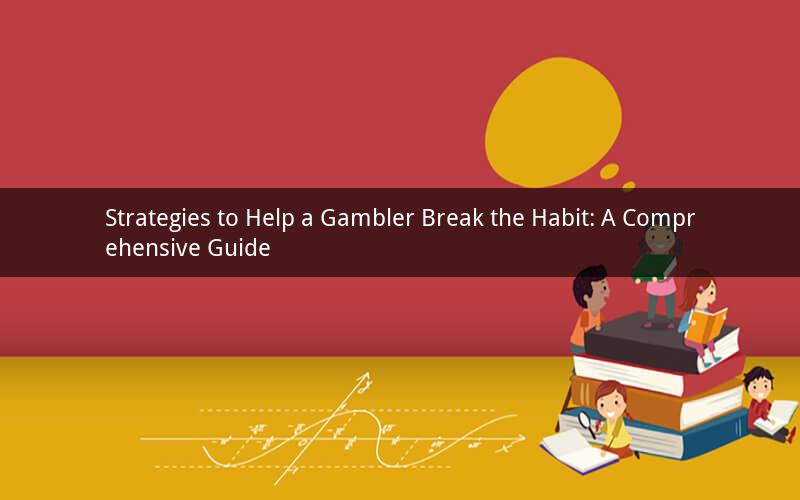
Introduction:
Gambler addiction is a serious issue that affects millions of individuals worldwide. Convincing a gambler to stop can be challenging, but it is crucial for their well-being. This article explores various strategies to help a gambler overcome their addiction and lead a healthier life.
1. Understanding the Problem
Before attempting to convince a gambler to stop, it is important to understand the nature of their addiction. Gambling addiction is a psychological disorder characterized by an irresistible urge to gamble, despite negative consequences. It is essential to recognize that gambling addiction is not a moral failing but a treatable condition.
1.1 Identifying Signs of Gambling Addiction
Signs of gambling addiction may include losing track of time while gambling, borrowing money to finance gambling activities, feeling restless or irritable when not gambling, and lying to family and friends about gambling habits.
1.2 Understanding the Psychological Impact
Gambling addiction can lead to a range of psychological issues, such as depression, anxiety, and substance abuse. Understanding the psychological impact of gambling addiction can help in addressing the underlying issues and motivating the gambler to seek help.
2. Building Trust and Communication
Establishing a strong relationship with the gambler is crucial in convincing them to stop. Building trust and open communication can help create a supportive environment for change.
2.1 Encourage Openness
Encourage the gambler to share their thoughts and feelings about their addiction without judgment. This can help them feel more comfortable and motivated to seek help.
2.2 Practice Active Listening
Show empathy and understanding by actively listening to the gambler's concerns. This can help them feel validated and supported in their struggle.
3. Educating the Gambler
Educating the gambler about the risks and consequences of their addiction can be a powerful motivator. Providing them with information about the psychological, financial, and social impact of gambling addiction can help them recognize the need for change.
3.1 Discuss the Risks of Gambling Addiction
Explain the potential consequences of gambling addiction, such as financial ruin, strained relationships, and mental health issues. Highlighting these risks can help the gambler understand the importance of seeking help.
3.2 Share Success Stories
Share stories of individuals who have overcome gambling addiction. This can provide hope and inspiration for the gambler, demonstrating that recovery is possible.
4. Encouraging Professional Help
Seeking professional help is a vital step in overcoming gambling addiction. Encourage the gambler to consult with a therapist or counselor specializing in addiction treatment.
4.1 Therapy Options
Discuss various therapy options, such as cognitive-behavioral therapy (CBT), group therapy, and residential treatment programs. Highlight the benefits of professional support in the recovery process.
4.2 Support Groups
Encourage the gambler to join support groups like Gamblers Anonymous, where they can connect with others who have faced similar challenges. Support groups can provide ongoing motivation and a sense of community.
5. Creating a Supportive Environment
A supportive environment is essential in helping a gambler overcome their addiction. Encourage friends and family to support the gambler's recovery journey.
5.1 Encourage Healthy Habits
Encourage the gambler to engage in healthy activities that can distract them from the urge to gamble. This may include exercise, hobbies, or spending time with loved ones.
5.2 Monitor Financial Activity
Help the gambler monitor their financial activity to prevent access to gambling funds. This may involve closing credit card accounts, setting up spending limits, or seeking assistance from a financial advisor.
5.3 Set Boundaries
Encourage friends and family to set boundaries and hold the gambler accountable for their actions. This can help create a supportive environment that fosters recovery.
6. Maintaining Long-Term Recovery
Overcoming gambling addiction is a long-term process that requires dedication and perseverance. Help the gambler maintain their recovery by providing ongoing support and guidance.
6.1 Celebrate Milestones
Celebrate the gambler's milestones in their recovery journey. Recognizing progress can help maintain motivation and reinforce positive behavior.
6.2 Encourage Relapse Prevention
Discuss relapse prevention strategies with the gambler, such as identifying triggers and developing coping mechanisms. Encourage them to seek help immediately if they experience a relapse.
6.3 Foster a Supportive Network
Encourage the gambler to maintain connections with their support system, including friends, family, and support groups. A strong support network can provide ongoing encouragement and guidance.
Questions and Answers:
1. Q: How can I help a loved one who is struggling with gambling addiction?
A: The most effective way to help is by showing empathy, offering support, and encouraging them to seek professional help. Educate yourself about gambling addiction and its consequences, and be patient throughout their recovery journey.
2. Q: Can therapy help someone overcome gambling addiction?
A: Yes, therapy can be a valuable tool in overcoming gambling addiction. Therapies like cognitive-behavioral therapy (CBT) can help individuals develop healthier coping mechanisms and address underlying issues contributing to their addiction.
3. Q: How can I help a gambler manage their finances during recovery?
A: Encourage the gambler to monitor their financial activity, seek assistance from a financial advisor, and close accounts that may lead to gambling. Set boundaries and offer support in developing a budget and financial plan.
4. Q: What should I do if my loved one relapses?
A: Relapse is a common part of the recovery process. Encourage your loved one to seek help immediately and remind them that relapse does not mean the end of their journey. Continue to offer support and encouragement throughout their recovery.
5. Q: Can support groups help in overcoming gambling addiction?
A: Yes, support groups like Gamblers Anonymous can provide ongoing motivation, a sense of community, and valuable insights from others who have faced similar challenges. Encourage your loved one to participate in support groups as part of their recovery journey.